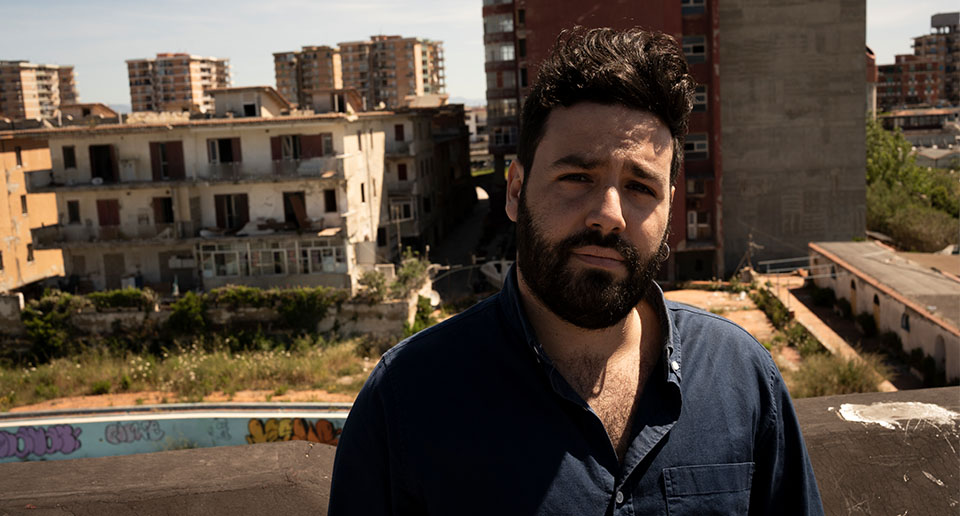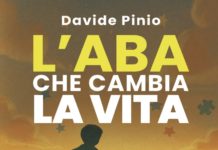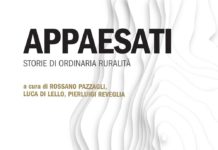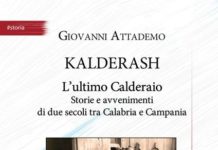Nato a Napoli il 17 giugno del 1990, Tommaso Primo (foto dal sito del Trianon) inizia a scrivere canzoni all’età di tredici anni, prediligendo l’uso della lingua napoletana. Nel 2011 pubblica il suo primo singolo, “Canzone a Carmela”, prodotto da Luciano Liguori, voce e basso de ‘Il Giardino dei semplici’. Seguirà, all’uscita del disco, uno Street Tour che lo porterà ad esibirsi nelle piazze delle principali città italiane. È nel 2013, però, che con il brano “Gioia”, duetto con il cantautore e poeta senegalese Ismael, riesce ad inserirsi nel panorama della musica emergente campana. Nello stesso anno pubblica il suo primo EP, “Posillipo Interno 3”, prodotto da Oscar Montalbano. Tra i suoi album: Fate, Sirene e Samurai (2015), 3103 (2018) e Favola Nera (2021).
«Sono cresciuto con mia nonna, che è stata per me una seconda mamma e un po’ il padre che ho perso presto – dice Tommaso. Nonna mi ha inculcato, nella mia mente da bambino e con la sua forte personalità, che le canzoni più belle in assoluto fossero le classiche napoletane o quelle dei cantanti di giacca che andavano di moda quando lei era giovane. Ed è così che quando i miei compagni e le mie compagne di classe ascoltavano i Backstreet Boys, Eminem e le Spice Girls, io sapevo le canzoni di Sergio Bruni, Mirna Doris e Angela Luce. Ora capite perché ho avuto tali influenze testuali e sonore? È stata la vita»
Dopo la partecipazione alla rassegna “Suoni contro muri” ideata da Marisa Laurito e il successo del concerto “Favola nera”, il Trianon Viviani accoglie anche per la stagione 2022/2023 un nuovo live di Tommaso Primo. Il cantautore partenopeo, tra i rappresentanti del new Neapolitan power, nel dicembre scorso ha registrato il tutto esaurito e si prepara a una nuova sorpresa per il pubblico del teatro della Canzone napoletana.
Sabato 4 alle ore 21 sarà sul palco di Forcella, nel cuore di Napoli, con uno spettacolo dedicato a “La sacra arte della canzone napoletana”, un patrimonio immateriale che, dalle villanelle a oggi, vanta più di un milione di opere. Storie inedite, racconti, fotografie delle varie epoche, in onore di un patrimonio artistico che vanta più di un milione di composizioni. Ne parliamo con lui.
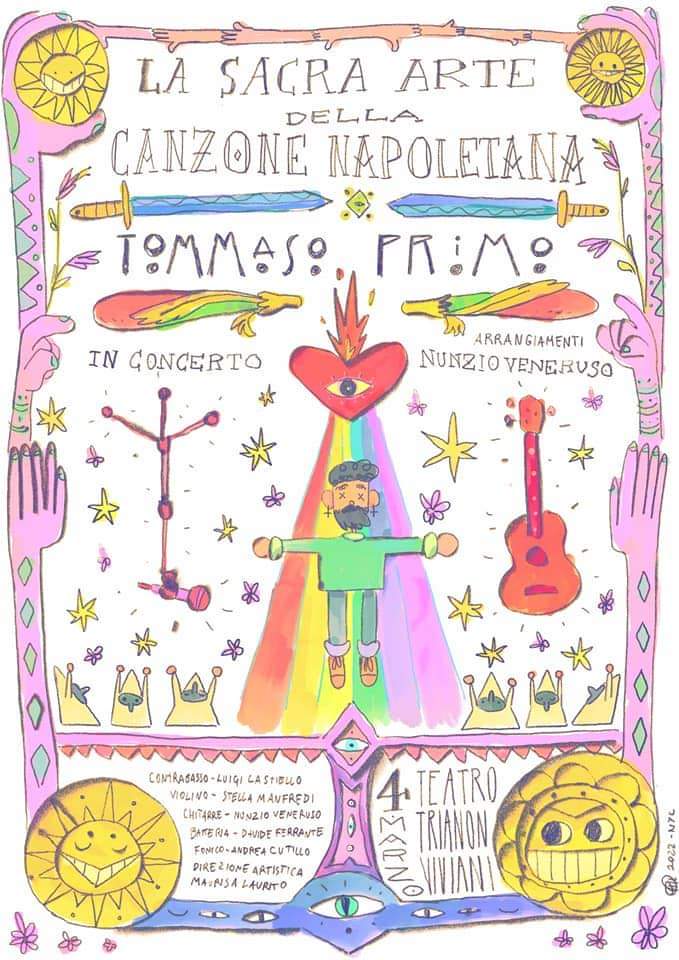
Ci vuoi raccontare la tua formazione musicale. Attraverso le tue canzoni cosa vuoi comunicare a chi ti ascolta, soprattutto cosa vuoi comunicare ai giovani? Eh sì, dobbiamo dirlo: i guagliuni di Napoli (e non solo) ti amano.
«Nelle canzoni c’è il mio spirito critico, la mia visione delle cose, il mio pensiero artistico, umano e spirituale. Cerco di comunicare a chi mi ascolta le mie sensazioni, i miei punti di vista. Odio quando gli ascoltatori distratti mi etichettano come uno che canta l’amore. Credo di cantare la politica, la società, la vita e la morte. La magia dell’esistenza. Mi adorano le persone come me, e io amo loro perché sono le uniche persone che mi stanno vicine»
Abbiamo letto che da quando hai iniziato a scrivere canzoni, prediligi la lingua napoletana. Come mai hai scelto di cantare in dialetto? C’è qualche cantante che ti ha influenzato e/o a cui ti sei ispirato/ti ispiri?
«Nell’VIII secolo a.C, i Cumani fondarono Partenope. Ora, ci sono tante ipotesi sulla vera identità di Partenope, ma quella a cui siamo più legati ci racconta di lei come una sirena. Siamo tutti figli di quella sirena, è per questo che abbiamo prodotto più di un milione di creazioni in forma canzone dal 1400 a oggi. Tutte rigorosamente in lingua napoletana»
Il 4 marzo sarà per te un gran giorno. Sarai in scena al teatro Trianon Viviani con uno spettacolo scritto e interpretato da te, interamente dedicato a “La sacra arte della canzone napoletana”. Come mai hai pensato di mettere su questo spettacolo?
«Perché la canzone napoletana è una delle mie grandi passioni, ma anche per dimostrare al pubblico quanto siamo “vicini”, nonostante il tempo, ai nostri avi»
Hai detto che sarà al 90% un concerto, ma non solo; ci vuoi dire cosa racchiude in sé, cosa rappresenta?
«Racconterò storie inedite, racconti, punti di vista. Vorrei accendere piccoli fuochi»
I giovani – napoletani e non – si identificano molto nelle tue canzoni, nei tuoi testi. Che sono semplici, genuini, e che spesso riescono ad arrivare al cuore delle persone. In tal senso, come ti senti nel sapere che la tua musica riesce a coinvolgere tanti giovani?
«Faccio tanta ricerca, studio molto per scrivere cose nuove. Cerco di rinnovarmi ogni volta e di vivere per poter comporre e sterrare strade nell’immateriale. Invece ho scritto cose complesse, non tutte capite, ma a cui sono molto legato perché rappresentano il me artista»
Grazie, Tommaso. E dopo questa bellissima chiacchierata, non ci resta che goderci lo spettacolo.
©Riproduzione riservata
Teatro Trianon/ Tommaso Primo and The sacred art of Neapolitan Song (Saturday 4 March, 9 pm)
Born in Naples on 17 June 1990, Tommaso Primo (photo) began writing songs at the age of thirteen, favouring the use of the Neapolitan language. In 2011, he released his first single, ‘Canzone a Carmela‘, produced by Luciano Liguori, voice and bass of ‘Il Giardino dei semplici’. The release of the album was followed by a Street Tour that took him to perform in the squares of major Italian cities. It was in 2013, however, that with the song ‘Gioia‘, a duet with the Senegalese singer-songwriter and poet Ismael, he succeeded in establishing himself on the emerging music scene in Campania. In the same year, he released his first EP, ‘Posillipo Interno 3‘, produced by Oscar Montalbano. His albums include Fate, Sirene e Samurai (2015), 3103 (2018) and Favola Nera (2021).
«I grew up with my grandmother, who was a second mother to me and a bit like the father I lost early on,’ says Tommaso. Grandma instilled in my mind as a child and with her strong personality that the absolute best songs were the Neapolitan classics or those of the jacket singers that were fashionable when she was young. So when my classmates listened to Backstreet Boys, Eminem and the Spice Girls, I knew the songs of Sergio Bruni, Mirna Doris and Angela Luce. Now do you understand why I had such textual and sonic influences? It was life»
After the participation in the ‘Suoni contro muri‘ festival conceived by Marisa Laurito and the success of the ‘Favola nera‘ concert, the Trianon Viviani welcomes a new live performance by Tommaso Primo for the 2022/2023 season. The Neapolitan singer-songwriter, one of the representatives of the new Neapolitan power, sold out last December and is preparing a new surprise for the audience of the theatre of Neapolitan song. On 4 March at 9 pm, he will be on stage at the Trianon Viviani Theatre, in Forcella, in the heart of Naples, with a show dedicated to ‘The sacred art of Neapolitan song’, an intangible heritage that, from the villanelle to today, boasts more than one million works. Untold stories, tales, and photographs of the various eras, in honour of an artistic heritage that, from the 15th century to today, boasts more than a million compositions. Let’s talk to Tommaso.
Tell us about your musical background. Through your songs what do you want to communicate to your listeners, especially what do you want to communicate to young people? Yes, we have to say it: the guys in Naples (and beyond) love you.
«In the songs there is my critical spirit, my vision of things, my artistic, human and spiritual thinking. I try to communicate my feelings, my points of view to the listener. I hate it when distracted listeners label me as someone who sings about love. I think I sing about politics, society, life and death. The magic of existence. People like me love me, and I love them because they are the only people close to me»
We have read that since you started writing songs, you prefer the Neapolitan language. How come you chose to sing in dialect? Is there any singer who has influenced you and/or inspired you?
«In the 8th century BC, the Cumani founded Parthenope. Now, there are many hypotheses about the true identity of Parthenope, but the one we are most attached to tells of her as a siren. We are all children of that siren, which is why we have produced more than a million creations in song form from 1400 to today. All strictly in the Neapolitan language»
March 4th will be a big day for you. You will be on stage at the Trianon Viviani theatre with a show written and performed by you, entirely dedicated to ‘The sacred art of Neapolitan song’. How did you come up with the idea of putting on this show?
«Because Neapolitan song is one of my great passions, but also to show the public how ‘close’ we are, despite time, to our ancestors»
You said that it will be 90% a concert, but not only that; would you like to tell us what it encloses, what it represents?
«I will tell untold stories, tales, points of view. I would like to light small fires»
Young people – Neapolitans and not – identify a lot with your songs, with your lyrics. Which are simple, genuine, and which often manage to reach people’s hearts. In that sense, how do you feel in knowing that your music manages to involve so many young people?
«I do a lot of research, I study a lot to write new things. I try to renew myself every time and live to be able to compose and wander roads in the immaterial. Instead I have written complex things, not all of which I understand, but to which I am very attached because they represent the artist in me»
Thank you, Tommaso. And so, after this wonderful interview, we just have to enjoy the show.


